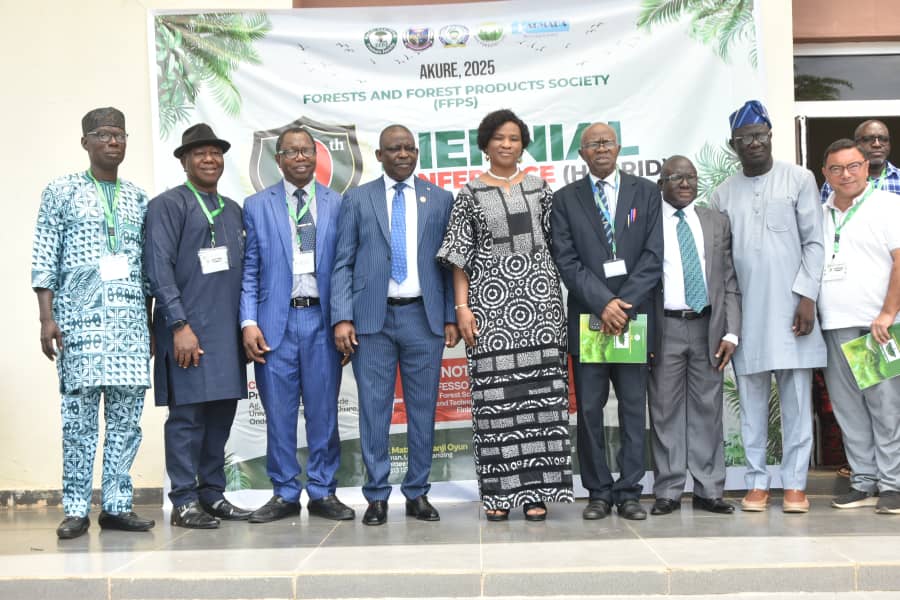The huge potential of Nigerian forests can be harnessed for better economic and environmental benefits through effective digital monitoring.
A Professor of Forest Information System at the University of Eastern Finland, Professor Timo Tokola, stated this while delivering a virtual keynote address at the 9th Forests and Forest Products Society (FFPS), Biennial Conference with the theme “Healthy And Resilient Forests for a Buoyant Nigerian Economy”, in Akure recently.
Tokola, who noted the high economic roles of forests to include medicinal plants, domestic timber, construction, furniture, panel, paper, bush meat, fibre, and ecosystem among others, affirmed that Nigeria’s forests have exceptionally huge ecological potentials if kept alive through digital management, healthy practices, and improved government policies.
Professor Tokola, however, noted some of the challenges facing the nation’s forests to include “Severe forest loss from agriculture, urbanisation, illegal logging, fuel wood, outdated management plans and lax enforcement at the state level, Infrastructure gaps, Mills technology, and weak treatability”.
He called for a shift from extraction to management with continuous inventory and digital transparency, as well as private sector leadership under clear rules.
The don also called for sustainable and socio-economic goals and natural forest policies that will help achieve realistic and improved forest gains.
The Vice Chancellor of the Federal University of Technology, Akure (FUTA), Professor Adenike Oladiji, in her remarks at the event, noted the need for more collaborations among institutions to advance the cause of Nigeria.
She commended the Elizade University, collaborating with FUTA, for hosting the conference. Oladiji, who noted the relevance of the conference to fostering academic gains, expressed the hope that the FFPS gathering will impact participants with implementable and impactful communication, considering the array of resource persons at the conference.
Prof Oladiji acknowledged that forest plays significant roles in our lives, including for the beautification of our environment, and were a means of survival for our forefathers who depended on them for basically all their needs.
On his part, the Vice Chancellor of Elizade University, Professor Sunday Adeyemo, said it was an honour for his University to host the International Conference.
He said he was optimistic that the knowledge acquired during the conference would be transformed into a buoyant idea to improve the national economy.
In his speech, the Ondo State Governor, Lucky Orimisan Aiyedatiwa, who was represented by a permanent secretary in the Ministry of Agriculture, Chief Segun Odusanya, noted the importance of the conference to the state, which is currently exploring all means to revive its forest, which has been degraded by human activities
He explained that the E.U. deforestation-free program has been an eye-opener to this state, as he vowed that the state will spare no effort in complying with the E.U. regulations and will do everything possible to stop deforestation.
In his welcome address, the president Forests and Forest Products Society, Prof Shadrack Akindele, said forests are not just clusters of trees but are the lungs of our planet, the guardians of our biodiversity, and the anchors of our rural economies.
The FFPS president, who is the current Vice Chancellor of Redeemer’s University, said that a healthy forest ecosystem supports water regulation, soil fertility, climate stability, and cultural identity, as he emphasised that Nigeria’s forests are under enormous pressure from deforestation, illegal logging, wildfires, and land use conflict, among others.
Despite all these setbacks, Akindele affirmed that, “Yet within these challenges, lie opportunities: opportunities for innovation, for reforestation, for green entrepreneurship and for redefining our national development trajectory.”
Earlier in his welcome address, the Chairman Local Organising Committee, Professor Mathew Oyun appreciated affirmed that the conference offers a unique platform for learning, innovation, as well as collaboration, as he charged participants to share their experiences and network with colleagues to make a real impact, which will contribute meaningfully to the future of our forest.















